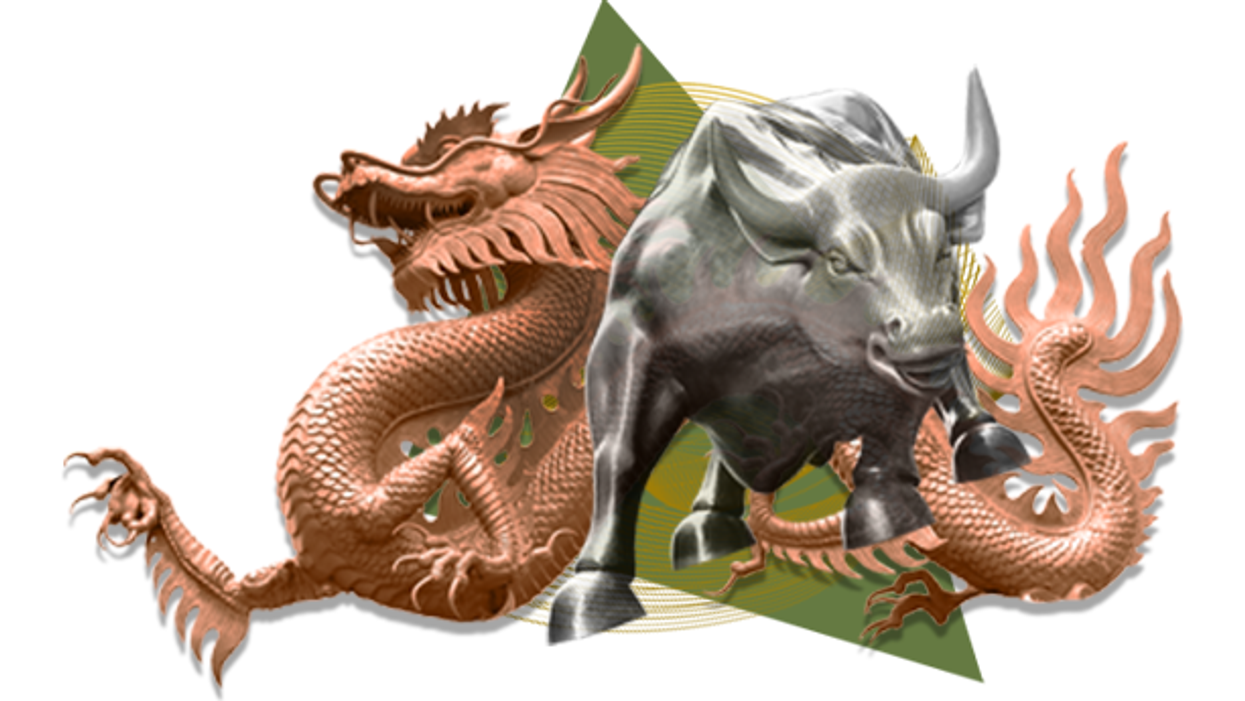
Episode 2: The world after coronavirus: Where's the upside?
Transcript: Season 1, Episode 2: The world after coronavirus: Where's the upside?
Meredith Sumpter: We are experiencing a once in a generation crisis, but there have been crises before, throughout the decades, the U.S. and other countries face shocks to the global system that changed life forever. These shocks cause major political and societal shifts, and they also impacted economies
Franklin D. Roosevelt: Yesterday. December 7th, 1941. A date, which will live in infamy.
News Anchor 1: The Middle East war produced developments all over the world. Today, the oil producing countries of the Arab world decided to use their oil as a political weapon.
News Anchor 2: Congress wants to know what to do about AIDS. Victims of the disease say the government has done nothing and has no plan to.
George W. Bush: Terrorist attacks can shake the foundations of our biggest buildings, but they cannot touch the foundation of America.
Sumpter: So how should we respond to the pandemic, the largest non-war crisis of our time? There is a lot that history can teach us, but we also must think carefully about how this crisis may be different. The pandemic is the first global crisis of our time to hit a world that is without global leadership. It is also the first to be witnessed unfolding in real time by billions of people around the globe. Our job is to make sense of these events and to assess what may happen as a result of them, to leaders, and to economies and to investors. I'm Meredith Sumpter, head of research strategy at Eurasia Group. Today, we will talk about the pandemic and what it means for the global economy, both now and in the future. I'm joined by two esteemed experts: Ian Bremmer, President and Founder of Eurasia Group. You've heard him here before, as host of this podcast. Hi Ian.
Ian Bremmer: Hey there, Meredith.
Sumpter: And David Bailin, Managing Director and Chief Investment Officer for Citi Private Bank.
David Bailin: Nice to be with you.
Sumpter: We're going to start by taking a look at the world BC: Before COVID. Then discuss the present situation and where all of this may be heading. First, we all convened in February for a similar podcast titled, “Should I Be Worried?” I think we have the answer to that question, but has anything surprised you both about how the pandemic crisis has played out in the past few months? David, let's start with you.
Bailin: What's been most surprising to me is the response of both the federal government in the United States and the Fed. They've managed to anticipate what would have been a financial calamity by passing bills that support individuals, businesses, and markets with an incredible massive amount of support, like three and a half billion dollars. And the Fed has stepped in to provide support for orderly markets, including loans for individual business programs and other activities like by purchasing ETFs for the very first time that have insured orderly markets, allowing companies to issue literally nine-hundred billion dollars of debt in the first four months of the year. So that's been the big surprise, but the second surprise for me has been the vast difference in the responses of different countries in the management of the pandemic. Something that Ian has talked a great deal about. And to me, that difference is going to have a deep and profound impact on both the course of the disease and its aftermaths.
Sumpter: Ian, what do you think about that?
Bremmer: Well, yeah, there's no question that the response has been radically differentiated. You can't look at Germany and the United States and say that these are equivalent responses from advanced industrial democracies. But I, I am surprised that in the middle of a pandemic that the United States is talking about pulling out of the world health organization. It's one thing to say that, you know, you want to beat up on China as responsible for the original sin of covering up and not handling well, the pandemic, it's another to go after the World Health Organization, That's a mistake and it's farther in the geopolitical challenges that we have as the backdrop then I think you would have expected. But the other thing that's interesting is that frankly, the United States. I mean, everyone complains about how bad and disjointed American governance and leadership is. But the fact is that the United States is actually, if you look at the per-capita death rates about the same in coronavirus, as Europe, as a whole, worse than Germany, better than the UK, better than France. I think that's interesting. It implies that actually it's not all just about the president and the executive. It's actually about the system, the governance as a whole, healthcare systems as a whole, resilience personal behavior. And when you put them all together, it turns out that we're not so different from each other or across this pond.
Sumpter: Hmm. That's really interesting. So my next question is, did the crisis, or is the crisis rather uncovering strengths and weaknesses of leaders and economic models?
Bailin: Well, there's no doubt something this profound, which is comparable to a war, brings out the character of the leaders. If you look at Angela Merkel in Germany, you can see somebody who simply speaks for the country who educated her country on what the challenges were and who expected all of them to have a unified response. We saw similar behaviors in Taiwan and in South Korea. In the United States, we saw a different type of leadership, which effectively delegated to the individual States, what the policies were going to be and minimize the role of the federal government. And obviously in China, which had the ability to control its economy and decide how it was going to manage the pandemic, had the ability to do a very different response. But when it comes to leadership, the question I would ask is whether or not the countries will be as well off or better off a year or two from now when the pandemic is at its end. That's how to judge whether or not the leadership has in fact, been strong, supportive and successful.
Sumpter: Noted, David. And certainly on that different leadership structures of both the US and China, let's not take a step back and remind listeners where US and China relations were before the pandemic. We had trade decoupling, China emerging as a powerhouse economy. Ian, what was life before COVID for the US and China?
Bremmer: Well, there wasn't any trust between the two countries, but there was a lot of interdependence. I mean, this is, these are the two largest economies in the world and they were trading a lot with each other. And even though the United States had a lot of complaints about theft of intellectual property, lack of an independent judiciary, lack of rule of law, you still didn't want to break the relationship. And what was most interesting was the beginning of a technology goal war where despite all of that interlinkage that the Americans and the Chinese were increasingly decoupling around big data and technology, national champions where the Chinese for a while, haven’t allowed companies like Facebook and Google and Amazon to do business in China, increasingly the United States, not allowing Chinese tech companies like ZTE, Huawei, to do business in the US and pushing American allies to ensure that those Chinese companies aren't doing business there either. That process was just gaining momentum before coronavirus hit.
Sumpter: David, can you speak to how the US and China were being valued by investors before the pandemic and how that might be changing now?
Bailin: Well, the circumstances that Ian talked about, I think speak to this concept that we have called G2. The idea that investors would build portfolios with companies that would parallel one another in a Chinese, global economic sphere and a Western global economic sphere on the other hand. So someone could buy, you know, a Facebook, you know, and, and a comparable company in China. And in doing so, they would gain exposure to a portfolio that would cover the world. Whereas before, if you had asked someone five or 10 years ago, they would have expected global companies to compete globally, but there's a more subtle impact that I think we should spend some time on, which is the question of technology and technology development. What we've seen in the last six months is the degree to which China has been dependent upon the US for semiconductor and other technologies and the unwillingness now of the government in the US to actually allow that free transfer of technology to take place to China.
And so now we're going to see an acceleration of the need to invest in research and development, which was already well underway in China, really explode. And that's going to cause the competition between the US and China to exponentially increase. As a result, there are going to be three markets, a Western market, an Eastern market led by China, and then a group of intermediate countries who are going to be willing to buy from both types of suppliers. That could turn out to be an interesting, possibly good benefit for investors because it'll actually create greater diversification in markets that they otherwise had really single suppliers, single global suppliers to count on.
Sumpter: Yeah, that's fascinating. Ian, David just spoke about a, G2, sort of an acceleration of decoupling, and the creation of three different buckets of markets, a Western market, an Eastern market, and a more of an intermediate market that will trade between the two. How does this fit with how you see the world evolving from here?
Bremmer: Look, I do think that we're seeing an unwind of globalization and that led to a lot of efficiency, but it also led to coupled performance and outcomes for markets all over the world up together, down together. I think in an environment where we're moving from one worldwide web to an internet of things that's actually broken in two, that involves so much more richness of everyone's data, surveillance, consumer behavior, health care. That is going to divide the global economy vastly more than we've experienced in our lifetimes. It'll cause less efficiency, lower quality growth, but also decoupling, and outcome, and performance. And that is speeding up dramatically as a consequence of coronavirus. Not only because of the greater confrontation between the United States and China, politically driven, but also because there's so much stress that these companies are going to be under. And if taxpayers are bailing them out, part of the conditionality will be to make the companies more patriotic. In other words, more capital and more jobs at home. Exactly the opposite of where the global economy has been heading for the last two generations.
Sumpter: So Ian, with this rise of us, China tensions, what is it with president Trump's strategy with China? Is this all election rhetoric or is it there's something more here?
Bremmer: Well, I mean the opposition to a closely interlinked and independent relationship, between the US and China is probably the only major foreign policy that has brought bipartisan support. So I don't think this is only about Trump at all. Now, layer on top of that, the fact that you're going to be entering the November elections with the worst economic performance in 2020 that the US has experienced since the Great Depression and high double-digit unemployment. Trump is not going to take responsibility for that. The easiest thing for him to do is blame the Chinese without whom no virus, not only because it came from Wuhan, but because 5 million Chinese were traveling out of Wuhan for a month before they admitted to this human-to-human they told the World Health Organization before the Americans or anyone outside their country was aware of it. So, I mean, I do think that the next several months are going to be unprecedentedly challenging. And so I do think this has real market implications going forward.
Sumpter: No, indeed. And ahead of November, US-China tensions being driven out by the pandemic effects on the US, what does this mean for other countries around the world? I mean, will they have to choose sides here?
Bremmer: Some clearly will. I mean, if you're talking about the United States putting real pressure on the ability of the Chinese, for example, Huawei, to get semiconductors and componentry from outside of mainland China, not only will that mean that those companies that were providing that face American sanctions, but it also means that the Europeans, the Australians, other American allies are gonna see that Chinese 5G rollout is going to be longer. It's going to be more costly. It's going to be much less certain than you were thinking it was before coronavirus. And so you're going to be much more willing to go along with American companies and the American platform, but it doesn't mean that these countries are going to stop trading with China. And also, there are a lot of countries around the world that cannot afford the Western alternatives and they have most of their external debt held by the Chinese, most of their trade held by the Chinese.
Bremmer: They're going to end up more in the Chinese ambit. So I do think that if you look at the developing world, some of the poorest countries in the world, Sub-Saharan Africa, and, and many other, I mean, Southeast Asia, certainly in many other emerging markets, they'll probably end up more close, more closely linked in supply chain to the Chinese. I think that the wealthy, advanced industrial democracies will end up more aligned with the United States, even if neither side is particularly happy about having to make that choice. I think that's where we're heading in that process is speeding up.
Bailin: And I think we're going to see something else take place exactly as a result of this, which is that larger companies that are more well capitalized that could spend more money on research and development are going to do better. America has a lot of those. Europe has some of those. There are a few smaller companies in Asia that are going to compete that are not in China, but the bottom line is that in order to be able to compete in the market, you're going to need to have a ton of capital in order to make the long term investments to build out that kind of infrastructure. And you're seeing this reflected in the stock prices of these companies, which have done extraordinarily well. You're seeing that they’re being valued for their ability to compete effectively with the Chinese, but to also bring together a large and very wealthy marketplace.
Bailin: One of the things that Ian was talking about is that China will instantly win over the countries and governments where it provides capital and is the largest lender. Fair enough. The question is, will the Chinese be able to win in markets that don't benefit from their large gesture in terms of lending. And that's why I think you've seen this response in markets, just to give you an idea. In 2008, and in 2009, technology firms literally were the same performers as industrial firms throughout the last great recession. This time, the technology firms were the leaders, the very companies that, that the president and the administration were worried about have actually turned out to be the saviors in this pandemic, both from an investment standpoint, and from a policy standpoint.
Bremmer: Technology companies are going to be some of the only big winners that come out of all this. This is how we're continuing to see the economy run today. It's also how you get out of this. If you want to ensure immunity passports, if you want to ensure that people are going to be able to get back to work, they need to have these tech companies aligned with them much more intimately than there were before. You're going to move away from privacy and the privacy concerns that have been raised by the Americans and the Europeans. Because if you don't give your data to these companies, you're not going to get on a plane. If you don't give the data to these companies, you're not gonna be allowed into your place of work. Your kid isn't going to be allowed into school, and you're not going to trust them in those places, because you're going to worry about other people that are there. So, I mean, the fact is that this is to get, to get a vaccine, get it implemented and find out who is, who is not safe. Who does, who does not have antibodies, is going to require incredible integration of our tech companies with the most intimate aspects of our lives. And we're going to be willing to do that because we're fighting a war against this virus.
Bailin: One of the other groups of companies that are clearly beneficiaries of this, and clearly are going to show Western leadership, is in the area of healthcare. Um, there are literally a hundred different companies working on vaccines, probably 15 of the top 20 companies are seriously involved. Some of the newest technologies are being rolled out to develop those vaccines. And over the last couple of days for the very first time I heard Scott Epstein, who is the former director of the FDA, enthusiastically speak about the idea that over the next six to nine months, we actually may have a vaccine. And this will be a second area where the West and the East will be competing with one another.
Sumpter: So, there are a number of trends happening on account of this crisis. And Ian, I want to go back to a comment you made earlier about labor in the post-COVID world as being a critical issue for country governments and, and fundamental to that social contract between a government and the people that it governs. So, one thing that people may not totally understand is this sort of light switch analogy and why when economies are reopened, some of the jobs that people lost just aren't coming back, why is that? And what can we expect moving forward?
Bremmer: Obviously, a lot of it has to do with: these are economies that have been completely shut down in terms of supply and demand, and restarting them is as much about every piece functioning and being safe and being profitable, or at least continuing to have suitable, stimulus and relief that it can function properly. So, you think about what it means to get a restaurant restarted, can a restaurant be profitable if it's only half full or two thirds full of that's the max capacity on top of all of the additional costs that they have to take on for enduring separation, sanitation, healthcare, and the rest? Can you get people safely to that place of work? Do their kids have access, still have the same sort of access to childcare, and to the school system, and how about the safety of public infrastructure?
Bremmer: I mean, every piece of that needs to work needs to work across the economy, or you're going to have to continue to pump enormous amounts of money into it. I think that the point is that in so many things, whether you're talking about the food supply network or you're talking about education, you're talking about entertainment, hospitality, sports, travel, you know, you name it. I think you're talking of until we have a vaccine, these economies are not going to experience a new normal, and that's why it's not about just flipping a switch.
Sumpter: David, what's your take?
Bailin: Well, looking at the data about 60% of the job losses that took place in the US and in Europe were associated with three different groups. One, are leisure companies, right? Everything from air travel hotels. One is education and healthcare, everything from doctor's offices to schools. And the third and most obvious was retail, where we literally saw the shutdown of the retail industry. Those happen to be two of the three, are some of the lowest paying jobs, in, you know, in both the US and Europe. And so, those people are displaced and to Ian's point, because a lot of those businesses are permanently damaged, or because the economic structure of those businesses like restaurants has been fundamentally changed, they're not coming back. And so that's the slow part of the recovery. The knock on effects are really all of the businesses in their cost of doing business, which Ian also touched upon, which is now just simply: hire.
Bailin: And those, those are the negatives. There are also some odd positives, whether it's delivery services, the fact that we will sell more automobiles than we would have before for personal safety reasons. The fact that people, when they don't take vacations, actually spend money on appliances and carpeting and fix up their homes. These are all of the sort of, you know, what happens when, you know, when this sort of, enormous impact from the virus takes place. What I think will drive a substantial and much more speedy recovery will be when the virus is actually, has a vaccine. And then we see the benefits to the economy and the incredible, innovative energy that can take place, because we've seen the benefits, for example, of working from home. We've seen people become more productive, you know, at the bank. At Citi Bank, where I work, the productivity is up more than 20% as a result of people not having to go back and forth from work.
Sumpter: David, let let's stick with you. There have been historic global stimulus efforts in response to the virus spread, but talk about what we've seen. Have these stimulus efforts been large enough to bridge some kind of economic collapse?
Bailin: Remarkably, the answer is yes. The very fact that the government and the Central Bank and those in the United States, Europe, Japan, China itself, have been willing to act early and have been willing to act in size, has had an enormous benefit to the economy. We estimate that somewhere around 12 trillion dollars of stimulus has been provided so far, and there'll be the necessity for another six trillion dollars next year. Stimulus of that magnitude is by definition inefficient and has unintended consequences, but when it's sufficiently large like that, it also creates an incredible blanket of protection for deeply impacted individuals, for markets, and for small and medium sized businesses. So, I think it's been extraordinary when we come back and look at this period of time, this will be something learned from the crisis in 2008 and 2009, when it took 15 months to do what some governments did in four weeks during this crisis. So I think it's a very big deal.
Bremmer: I just want to say, I agree completely with that. And I think one thing that we shouldn't lose sight of, is that the entirety of the U S government came together in a bipartisan fashion. There's such a divide between red states and blue states on reopening, on mask wearing, on Trump. I mean, it's an incredibly divisive time. And yet when the economy desperately needed it in the US I mean, this could have been such a profound disaster. You saw Mnuchin and Pelosi working together across the aisle to get this thing done and done fast. And by the way, Jay Powell as well, Fed Chairman, I mean, not only the Republicans, but every major Dem I know, every major economist from the Obama Administration, I've talked to Jack Lew, I've talked to Larry Summers, I've talked to Peter Orszag, all of them, they give him fantastically high marks. So, I think we should recognize that, you know, for as much as people want to criticize that the US governance is a disaster, on the economic side, so far, the US performance has actually been pretty good.
Sumpter: Ian, with all of that bipartisan effort in Washington, even so, you've said that we are facing real risk of a depression. So, explain why and what that means?
Bremmer: Well, look, I mean, there's no formal technical definition of a depression. What we know is that it is deeper and longer lasting, and broader, than a recession. And I think by pretty much every indication if the great recession in 2008 was the biggest that we had seen since the Great Depression, on pretty much every front. I see that as the case right now, not just in terms of the scale of the pandemic and how long it will take to get to a vaccine and get to new normal and how many emerging markets will fall off a cliff as a consequence, and how much money will be necessary to keep people whole, but also because it's happening against the backdrop of such geopolitical recession, the fact that there is no leadership that we could come out of this in a US-China Cold War, that there will be a massive nationalism around vaccines that this will push us towards nationalism on things like food production and labor and pharmaceuticals, not just technology.
Bremmer: All of that implies to me, not that this is a great depression, but that we should think of it more differently than another major recession, another Great Recession. I think the implications are going to be much more structural, and I think it would help us to understand the seriousness and the gravity of the situation. I also think that the reason people don't want to call it a depression is because they think in terms of the Great Depression, how bad that was forced, but that's because we were much less resilient then. I mean, the wealth of the middle class in the United States during the Great Depression was much closer to subsistence level, than even middle classes in countries like Brazil or Turkey today. And so, as a consequence, even though you're going to have a massive and long-lasting contraction, there's a lot more wealth from the system science and the system human capital in the system to respond to it effectively today.
Bailin: So, I rarely disagree with Ian, but this is one of those times because when you take a look at the Great Depression, which lasted for five years, which also saw unemployment of almost 25%, which is probably the only comparison that we have to the current circumstance, it's extremely different. Number one, in the great depression, we didn't have the kind of government response to the central government response that we had on now. We are going to see growth begin in the third quarter of this year. So we'll see a negative 40% GDP rate for the second quarter. We'll see a positive 30% in the third quarter alone. That did not happen in the Great Depression. We're going to see probably half the people who got unemployed re-employed over the course of the first 12 months, and then a much slower pace after that, we're going to see a lot of new business formation that we didn't see in the Great Depression.
Bailin: And certainly, there are literally trillions of dollars of capital that are going to be put to work, to recycle, businesses that need restructuring or refinancing or recapitalization, all of which again, did not happen in the Depression. So, I see this as a very, very different time, and a very different kind of recession that was due to an exogenous shock. If this had been a traditional, quote, you know, “Great Recession,” you know, if you will, or, near depression, it would have affected every part of the global economy, every company, every country. Here, it's done in some parts of the economy. It has the benefit actually of having a technology, of course as a bright star, you know, that there were no industries that did well during the Great Depression, certainly even the people that delivered food during that time were impacted negatively.
Bailin: So, I think this is very, very different. I do think this is equally profound in the sense that, you know, it's a once-in-a-century event and it is certainly something that no one seemed adequately prepared for. But I will say, and to Ian's point about Powell and others, that there have been people who've stepped up, decisions that got made to ensure that we didn't have a depression. And so now, if any, if you take a look at the stock market, he clearly agrees with the fact that we're not going to have a depression. We'll see if it's right. But, but that's, you know, that's my point of disagreement with him. I think that Ian, and I think that, you know, it's a big word to call something, “a depression,” given what we've had historically. I think what we're going to have here is a narrow, deep, traumatic recession, but fairly significant and robust growth that takes place to bring us back to where we were within two years.
Bremmer: I think where we squared the circle is if we're just talking about the United States or even the advanced industrial economies. I'm convincible by David. But when we talk about the global order and we talk about where the developing world is going to be, I think a lot of them are gonna experience something, particularly middle income economies. It's going to feel a hell of a lot worse than that. So maybe, maybe we're somewhere in between.
Bailin: All right. We'll find out.
Bremmer: Yeah. Yeah.
Sumpter: Last question, gentlemen, there's always a lag in our understanding of crises and in this crisis, both in terms of the virus and the economic impacts, what are people who are only looking at numbers today missing in their analysis?
Bremmer: I think people that only look at numbers, or not understanding the human dimensions of what it means to be cooped up by yourself, or with a large number of people in space that is entirely too constrained. What it means to be scared about the vector of this unknown. What it means to be scared about the future of a job that you may or may not have when you get through this. When you don't have any money saved up and you don't know how you're going to get through your next billing cycle. You know, I mean, there are an awful lot of human stories. And even in the world's wealthiest country, the United States, there are a lot of people that are suffering psychologically, emotionally, um, in ways that are impossible to quantify, that this president does not show particular empathy or leadership for, and that we don't have particularly well funded institutions, or as robust a sense of community to take care of these people. And of course, ultimately one of the reasons why the United States became the world's leading superpower is because of the “civic virtue,” because of the sense of value, common value, because the Americans stood for something that a lot of other countries believed in. I think you lose a lot of that when you have a crisis of this dimension. And it's very hard to get that when you're just looking at how steep the decline is and what the markets are doing next week.
Bailin: I believe that the issue that will not be seen in the data will be the degree to which the pandemic has exacerbated economic inequality, all around the world, Western economies, Eastern economies, everywhere. And the consequences of that, I think will be profound because the rich are gonna get richer, the poor they're going to get poor at an accelerating rate. I'm very curious to see Ian's point of view on this, but when we talk about populism, the type of populism that's going on now is this appeal to a group of people who have been underserved by government, and who, you know, can't, you know, have had enough and can't take it anymore. And so they're willing to have a populace to come in, who promised things that they may or may not deliver. Now, the question is, will the economic inequality become so severe that other possibilities emerge? And I'm curious as to your view, Ian, on that.
Bremmer: Yeah. I mean, if you mean the kind of social dissent that could actually cause revolutionary violence, I think the answer that in the developing world is no. Some of that is because there's a lot more wealth. And so even with a safety net that's broken, you're not talking about, you know, Tunisia or Egypt style depredation that would force people onto the streets. And part of it is because people are themselves so much more segregated that when you see the kind of violence that would really deeply trouble, you and me, it tends to take place outside of polite and civil society. And so, as a consequence, we don't think it's systemic, whether it's prison riots in the United States for the most widely incarcerated population in the world, or whether it's massive amounts of gun violence, which of course has gone down given the coronavirus quarantine, but we'll go up again, of course, only in parts of the country that have largely been forgotten about and has been walled off effectively from places where people that vote at higher levels and participate more in political society live.
Bailin: Right. So, I want to throw out one sort of contrasting point of view, which is if Western governments can afford to spend this kind of money on a crisis and actually be able to afford it, then they theoretically could also spend money on infrastructure projects or even on, you know, ensuring that people make a certain amount of money, you know, minimum wage protection in the country. So I do think that that's an interesting commentary as to whether or not that could, that could come up as a policy debate in the future.
Sumpter: Ian, what do you think?
Bremmer: Of course, I think it's necessary. I just think that the ability to get it done and, but I do believe that the scale of this crisis is already creating conversations that need to happen in a way overdue. Conversations about universal basic income, which I don't think is the answer, but we certainly need experimentation and more data conversations about supporting people with the kind of richness of benefits that would befit a gig economy, as opposed to one where we expect that people are employed by a single employer for long times as permanent. I think the infrastructure spend is certainly going to be discussed. The question is how urgent, how lasting, is this crisis big enough to force conversations like that, that are really going to cost. And I think at the margins, the answer is yes, at the core. The jury is still out.
Sumpter: As our listeners continue to deal with pandemic effects. You both have given us a lot to think about. Ian Bremmer and David Bailin, thanks so much for being here.
Bremmer: Good to be with you.
Bailin: Thank you Meredith, much enjoyed it.
Sumpter: As a programming note, before we go, Citi Private Bank and GZERO Media are teaming up to bring you a new podcast series this fall “Living Beyond Borders.” We'll explore the biggest geopolitical and economic trends impacting your life as a global citizen and investor, as well as what sustainability and progress looks like in a post-pandemic world. That starts this September. Stay tuned. Thanks to everyone listening. For GZERO World, I'm Meredith Sumpter, be well and stay safe.

















